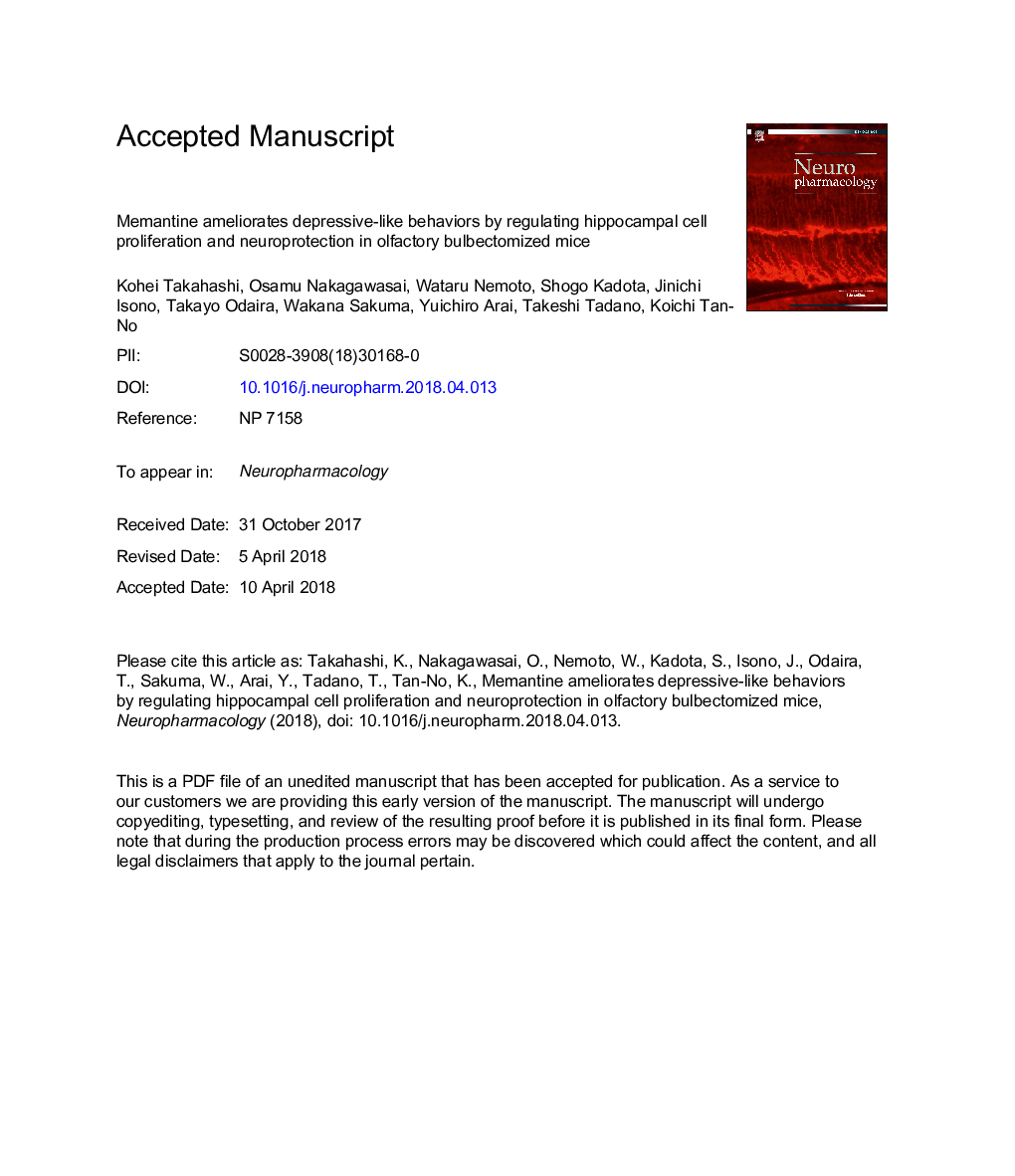| Article ID | Journal | Published Year | Pages | File Type |
|---|---|---|---|---|
| 8516464 | Neuropharmacology | 2018 | 58 Pages |
Abstract
Our previous study suggested that the non-competitive N-methyl-d-aspartate receptor antagonist memantine (MEM) inhibits dopamine (DA) reuptake and turnover by inhibiting brain monoamine oxidase. Clinical studies have reported that MEM may improve depressive symptoms; however, specific mechanisms underlying this effect are unclear. We performed emotional behavior, tail suspension, and forced swimming tests to examine whether MEM has antidepressant effects in olfactory bulbectomized (OBX) mice, an animal model of depression. Subsequently, we investigated the effects of MEM on the distribution of tyrosine hydroxylase (TH), altered microglia morphometry, and astrocyte and cell proliferation in the hippocampus with immunohistochemistry. We also investigated MEM effects on the levels of norepinephrine (NE), DA, and their metabolites with high performance liquid chromatography, and of neurotrophic, proinflammatory, and apoptotic molecules in the hippocampus with western blotting. Forty-two days after surgery, OBX mice showed depressive-like behaviors, as well as decreased levels of monoamines, reduced cell proliferation, and lower levels of TH, phospho(p)-TH (ser31 and ser40), p-protein kinase A (PKA), p-DARPP-32, p-ERK1/2, p-CREB, brain-derived neurotrophic factor (BDNF), doublecortin, NeuN, and Bcl-2 levels. In contrast, the number of activated microglia and astrocytes and the levels of Iba1, GFAP, p-IκB-α, p-NF-κB p65, TNF-α, IL-6, Bax, and cleaved caspase-3 were increased in the hippocampus. These changes (except for those in NE and Bax) were reversed with chronic administration of MEM. These results suggest that MEM-induced antidepressant effects are associated with enhanced hippocampal cell proliferation and neuroprotection via the PKA-ERK-CREB-BDNF/Bcl-2-caspase-3 pathway and increased DA levels.
Keywords
PLSDpKaDARPP-32NeuNi.p.MHAERKBcl-2NMDAN-methyl-d-aspartateROIGFAPDOPACp.o.MAOOBXCREBBcl-2-associated protein xIκB-αNF-κBPBSIL-6IBA1PFC5-bromo-2′-deoxyuridineBDNFPer osneuronal nuclear antigenDepressionNeuroinflammationinterleukin-6BaxBrdUanalysis of varianceANOVAtumor necrosis factor-αCell proliferationtyrosine hydroxylaseprotected least significant differenceApoptosisstandard error of the meanIntraperitoneallyDopaminedihydroxyphenylacetic acidEmotional behaviordentate gyrusBrain-derived neurotrophic factorTNF-αNuclear factor-kappa Bprefrontal cortexMEMPhosphate-buffered salineSEMMemantineregion of interestionized calcium binding adaptor molecule 1monoamine oxidasenorepinephrinehomovanillic acidcAMP-responsive element binding proteinGlial fibrillary acidic proteinprotein kinase AExtracellular signal-regulated protein kinaseHVAOlfactory bulbectomy
Related Topics
Life Sciences
Neuroscience
Behavioral Neuroscience
Authors
Kohei Takahashi, Osamu Nakagawasai, Wataru Nemoto, Shogo Kadota, Jinichi Isono, Takayo Odaira, Wakana Sakuma, Yuichiro Arai, Takeshi Tadano, Koichi Tan-No,
